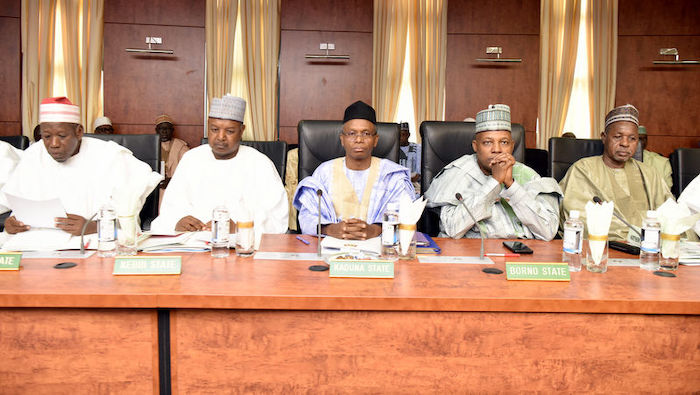The state governments of Kaduna, Kogi, and Zamfara have petitioned the Supreme Court for a restraining order to halt the new naira notes policy from taking effect.
In a motion ex-parte filed by their lawyer, AbdulHakeem Uthman Mustapha (SAN), the three northern states are asking the apex court to grant them an interim injunction preventing the Federal Government, acting alone or through the CBN, commercial banks, or its agents, from ending the timeframe within which the now-outdated 200, 500, and 1000 Naira denominations may no longer be legal tender on February 1.
The three state Attorneys-General and Commissioners of Justice are the Plaintiffs, while the single Respondent is Abubakar Malami (SAN), the Attorney-General of the Federation and Minister of Justice.
Since the announcement of the new naira note policy, there has been a significant shortage of new naira notes in Kaduna, Kogi, and Zamfara States, making it difficult and often impossible for citizens who have faithfully surrendered their old notes to go about their everyday lives.
They also criticized the notice’s inadequacy, the exercise’s haphazardness, and the suffering it’s causing Nigerians, which the Federal Government of Nigeria has acknowledged.
The Plaintiffs further argued that the Federal Government’s ten-day extension is insufficient to fix the policy’s issues.
At a news conference in Lagos over the weekend, the CBN Governor stated that the apex bank will not extend the deadline for swapping old naira notes for new ones.
The Plaintiffs filed a motion on notice to shorten the period the Respondent has to file and serve his Counter-Affidavit to this Litigation and an order for an accelerated hearing in the apex court suit.
The states want a declaration that the Federation’s Demonetization Policy, carried out by the Central Bank of Nigeria under the President’s orders, violates the Constitution of the Federal Republic of Nigeria 1999 (as amended), Central Bank Act, 2007, and relevant laws.
They are also asking the court to declare that the three-month notice given by the Federal Government of Nigeria through the Central Bank of Nigeria under the directive of the President of the Federal Republic of Nigeria, which will render the old banknotes inadmissible as legal tender, is in gross violation of Section 20(3) of the Central Bank of Nigeria Act 2007, which requires reasonable notice before s.
The Plaintiffs also want the court to declare that under Section 20(3) of the Central Bank of Nigeria Act 2007, the Federal Government of Nigeria, through the CBN, cannot set a deadline for accepting and redeeming banknotes issued by the Bank, except as limited by Section 22(1). The Central Bank always redeems banknotes.
The Plaintiffs also seek the court to immediately suspend the Federal Government of Nigeria’s demonetisation through the Central Bank of Nigeria under the President’s direction until it complies with the law.
In an affidavit supporting the complaint, Kaduna State Attorney General and Commissioner for Justice Aisha Dikko stated that while the naira redesign policy was intended to promote the Federal government’s cashless strategy, not all transactions can be done electronically.
She argued that the Federal Government must have enough money in circulation to keep the economy functioning smoothly because many transactions still require cash.
Dikko further noted that the Federal Government has implemented the strategy in a short time frame, which has hurt Nigerians in Kaduna, Kogi, and Zamfara States and their governments, especially because the newly redesigned naira notes are not accessible for usage.
“That the majority of the indigenes of the Plaintiffs’ states who reside in rural areas have been unable to exchange or deposit their old naira notes as there are no banks in the rural areas where the bulk of the population of the states reside.
Most rural residents of the Plaintiffs’ states don’t have bank accounts and can’t deposit their life savings in old naira notes.
“Due to hardship, people in numerous states are restive, and law and order may soon collapse.
“The Plaintiff State Governments must act to safeguard their citizens and maintain peace and order.
“I know that if the Federal Government of Nigeria had allowed sufficient and appropriate time for the naira redesign program, the Plaintiffs’ State Governments and people in the various states would have avoided all the current pain and loss.
I know the Federal Government’s 10-day extension won’t fix the policy’s problems. Even though senior naira notes are no longer legal cash, the Federal Government cannot prevent Nigerians from redeeming them.
“Unless this Honourable Court intervenes, the Government and people of Kaduna, Kogi, and Zamfara State will continue to go through a lot of hardship and would ultimately suffer great loss as a result of the insufficient and unreasonable time within which the Federal Government is embarking on the ongoing currency redesign policy,” she said.
The suit has no hearing date.
